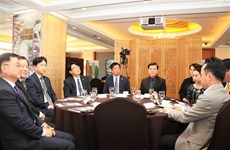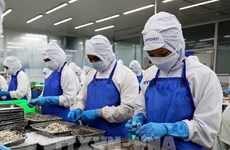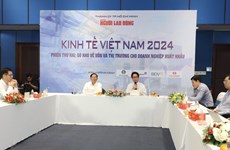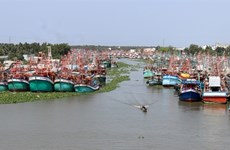Local firms face FTA challenges
Vietnamese enterprises are preparing for further integration as the
country is close to signing many free-trade agreements (FTAs), which
will bring not only opportunities but also challenges.
Vietnamese enterprises are preparing for further integration as the
country is close to signing many free-trade agreements (FTAs), which
will bring not only opportunities but also challenges.
According to Pham Xuan Trinh, General Director of the Phong Phu Corporation which operates in the garment and textile sector, foreign firms are pouring investments into this sector to take advantage of the benefits that the Trans-Pacific Partnership Agreement will bring.
Domestic producers, as a result, will face increased competition from international firms that have the advantages of capital and technology.
Van Duc Muoi, General Director of Vissan, said food products must meet the requirements of hygiene and safety standards, of displaying the place of origin and having competitive prices.
Companies need to hasten their restructuring and plan a clear development strategy, according to experts from the Vietnam Chamber of Commerce and Industry.
Enterprises said that the Government should provide related information in advance to help them prepare well for the integration, or else they will not be able to perform well.
Tran Do Lien, Deputy President of Tien Giang Province's Business Association, said that about 80 to 90 percent of the companies in the province do not have adequate understanding of the coming economic agreements.
Vietnamese enterprises might fail to grasp the opportunities without careful preparation, he warned.
Le Thi Thu Lai, director of a handicraft company, said that the Government should improve the legal system to ensure consistency and transparency, and also improve the business climate.
Vo Tri Thanh, Deputy Director of the Central Institute for Economic Management, in an interview with Tin Tuc newspaper said that companies themselves must innovate to adapt to integration, while the Government should have policies to support vulnerable industries.
The country is in the process of negotiating important FTAs, including the Trans-Pacific Partnership and the Vietnam-EU FTA.-VNA
According to Pham Xuan Trinh, General Director of the Phong Phu Corporation which operates in the garment and textile sector, foreign firms are pouring investments into this sector to take advantage of the benefits that the Trans-Pacific Partnership Agreement will bring.
Domestic producers, as a result, will face increased competition from international firms that have the advantages of capital and technology.
Van Duc Muoi, General Director of Vissan, said food products must meet the requirements of hygiene and safety standards, of displaying the place of origin and having competitive prices.
Companies need to hasten their restructuring and plan a clear development strategy, according to experts from the Vietnam Chamber of Commerce and Industry.
Enterprises said that the Government should provide related information in advance to help them prepare well for the integration, or else they will not be able to perform well.
Tran Do Lien, Deputy President of Tien Giang Province's Business Association, said that about 80 to 90 percent of the companies in the province do not have adequate understanding of the coming economic agreements.
Vietnamese enterprises might fail to grasp the opportunities without careful preparation, he warned.
Le Thi Thu Lai, director of a handicraft company, said that the Government should improve the legal system to ensure consistency and transparency, and also improve the business climate.
Vo Tri Thanh, Deputy Director of the Central Institute for Economic Management, in an interview with Tin Tuc newspaper said that companies themselves must innovate to adapt to integration, while the Government should have policies to support vulnerable industries.
The country is in the process of negotiating important FTAs, including the Trans-Pacific Partnership and the Vietnam-EU FTA.-VNA













